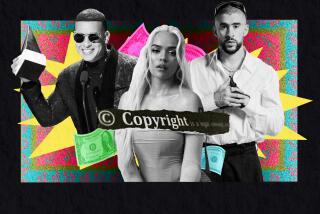Parody a ‘Big Hairy’ Mess for Courts : When 2 Live Crew redid ‘Oh, Pretty Woman,’ it raised hackles. But judges have had a tough time drawing the line between humor, piracy.
- Share via
WASHINGTON — In 1989, Luther Campbell, leader of the rap group “2 Live Crew,” wrote his own version of the late Roy Orbison’s 1964 classic, “Oh, Pretty Woman.”
Initially, the two songs sound the same. A pretty woman is spotted walking down the street. But where Orbison’s lyrics conjure up a fantasy of longing and fulfillment, the rapper tells a more brutal tale. On second glance, the pretty woman turns out to be “a big hairy woman.”
Not surprisingly, the copyright owners of Orbison’s song, Acuff-Rose Music of Nashville, were not pleased. They saw the rap version as a vulgar takeoff that could tarnish the original, and they refused to license the use of their song.
Undeterred, 2 Live Crew included its rendition on the album “As Clean as They Wanna Be” and sold 248,000 copies by early 1990.
Acuff-Rose sued, seeking damages for copyright infringement.
Now that dispute has forced the Supreme Court to resolve a question that has long bedeviled judges, as well as entertainers and composers. Is it parody or an act of piracy when a performer alters and records an old song?
In general, the Copyright Act gives the creators of an original work the sole right to control its use and to profit from any re-recording. But the law also makes a limited exception for purposes “such as criticism, comment, news reporting (and) teaching.”
Comedians such as Mark Russell and the crew of NBC’s “Saturday Night Live” have lined up with the rappers in this case, arguing that the copyright law and the First Amendment permit performers to poke fun by using classic songs. They say their work is a form of “criticism (and) comment” on the original.
But composers and their heirs say that no one should have a legal right to profit by piggybacking on their creative works. They say the Copyright Act was designed to protect creators, not to license “musical plagiarism.”
BACKGROUND: The U.S. appeals courts have divided on this question.
The courts in New York and California have given wide latitude to those who parody original works. For example, the U.S. appeals court in New York threw out a copyright suit filed against “Saturday Night Live” over its treatment of an advertising jingle for New York City. A skit involving the “city of Sodom” had the city fathers bemoaning its reputation for crime, corruption and pollution. Their solution: Popularize a theme song titled, “I Love Sodom,” sung to the tune of “I Love New York.” The appeals court said the law should protect a parody that “builds upon the original . . . and contributes something new for humorous effect or commentary.”
Adopting a similar approach, the U.S. appeals court in California dismissed a copyright suit filed by the composers of “When Sunny Gets Blue.” Disc jockey Rick Dees had written a takeoff of it entitled, “When Sonny Sniffs Glue.”
But last year, the U.S. appeals court in Cincinnati took a different approach in the 2 Live Crew case. It declared that a “blatantly commercial” use of an original work is prohibited by the Copyright Act and ruled that the rap group must pay damages to the owners of the song by Orbison, who died in 1988.
ARGUMENTS: The justices will hear the case of Campbell vs. Acuff-Rose, 92-1292, today.
Advocates for 2 Live Crew’s position say the justices should make clear that a parody is permitted as an exception to the copyright laws.
If the high court rules for Acuff-Rose, “it will call into question the viability of parody as an art form,” said Boston College law professor Arthur C. Yen, who filed a brief on behalf of several copyright experts. Since nearly all performances by comics or singers are “commercial,” they could be banned under the standard set by the Cincinnati court, he said.
But lawyers for famed composers say that if any parody is permitted, the value of an original work can be destroyed. “I think they need to consider the concept of artistic control,” said New York attorney Stephen R. Kaye, who represents the heirs to such composers as Cole Porter, Irving Berlin and George Gershwin. “If you take ‘White Christmas’ and make it into a song about cocaine, then it tarnishes the original work,” he said.
The high court is likely to issue a written opinion early next year.
More to Read
The biggest entertainment stories
Get our big stories about Hollywood, film, television, music, arts, culture and more right in your inbox as soon as they publish.
You may occasionally receive promotional content from the Los Angeles Times.











